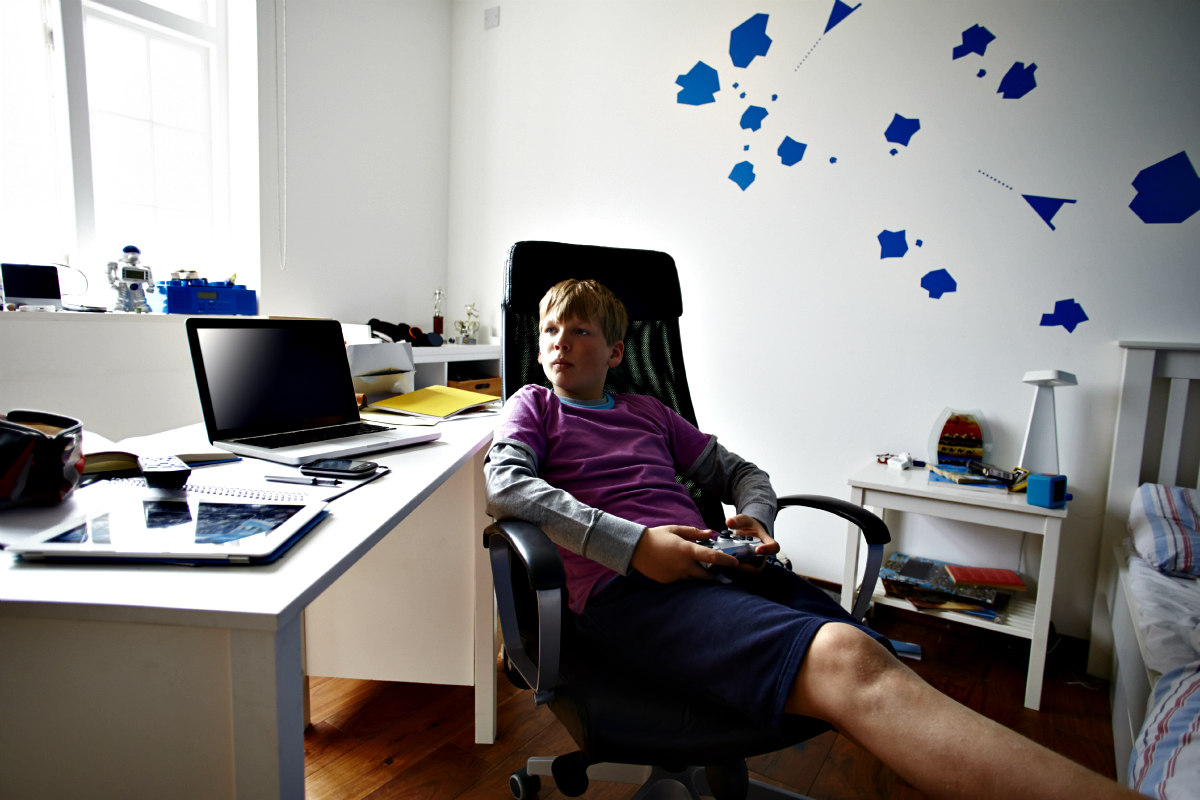Overly Attached or “Addicted” to Screen Time?

It is likely that many have experienced being involved in screen time games. We may lose ourselves in hours of screen time without even being aware. Or we may have experienced someone who has spent hours gaming and found the person to be difficult to be with due to moodiness, irritability and defiance.
The truth is that being engaged in screen-time activities is stimulation. It is easy when losing track of time to put our body and mind into a state of being overstimulated without realizing it. Doing this day after day means our body is put into a chronic overstimulation which means our body is in fight or flight mode without any let down and rebalancing. This can lead to poor moods, increased anxiety, higher levels of irritability and poor behaviors. Research has looked
at the connections between the use of electronic devices and mental health, finding that as use increases so does the risk of mental health problems. (Beurken,
2017)
Monitoring children’s screen time is probably a norm in many homes; trying to figure out how to set those limits so kids will go out and do other things has become increasingly challenging. Studies show that screen time impacts the brain development, mood and behaviors. The discussion around screen time questions if one is over attached to screen time or if one is addicted. Now we can look at the criteria needed to be considered a diagnosis of a gaming disorder.
The World Health Organization has announced “gaming disorder” as a new mental health condition. This disorder will be included in the 11th edition of its International Classification of Diseases (ICD).
Characteristics of this disorder include three major diagnostic features:
1. The gaming behavior takes precedence over other activities to the extent that other activities are taken to the periphery.
2. A persistent or recurrent behavior pattern of sufficient severity has emerged.
3. The condition leads to significant distress and impairment in personal, family, social, educational or occupational functioning.
Overall, the main characteristics are very similar to the diagnostic features of substance use or gambling disorder. The negative pattern of behavior must last at least 12 months although exceptions are made when the other criteria are met, and the symptoms are severe enough. (CNN WIRE, 2018)
Even though gaming is prevalent, the overall prevalence of this condition is low, according to Dr. Vladimir Poznyak, a member of WHO’s Department of Mental Health and Substance Abuse. This diagnosis is a clinical condition and the clinical diagnosis can be made only by trained health professionals. Allowing for the diagnosis sets up awareness within the mental health community, alerting the professionals to the existence of the disorder and allowing for appropriate treatment for those who suffer from this disorder. (CNN WIRE, 2018)
Not all professionals agree with the inclusion of gaming disorder in the ICD. Some professionals believe that the gaming behavior is being used as a coping mechanism to manage anxiety and depression. If the anxiety and depression are dealt with, often the gaming behaviors decrease significantly. Professionals in this camp also believe that it is a slippery slope to include this as a mental health disorder. Anything can be considered addictive such as watching too much T.V., drinking too much soda, walking too much, social media, etc.
If you, as a parent, are concerned about your child’s behaviors around gaming, you may want to get involved in the games your children are playing and understand the social interaction that goes along with the game. Watching the overt qualities of the gaming style involved in the game can bring some understanding to why the game is interesting to the gamer. It would be good to limit the amount of time you allow the child to be on the games. Even those gamers who aren’t considered heavy game players spend plenty of time on the games.
So watching for changes such as if gaming is done at the exclusion of other activities or with changes in physical, psychological health or social functioning will tip you off if you are playing too much or if someone you care about is playing too much. If this is what you are finding, then it may be time for some changes before you move into a full-blown addictive pattern.
Works Cited
Beurken, D. N. (2017). Dr. Nicol’s tech guide for parents. USA. CNN WIRE. (2018, June 25).
myfox8.com/2018/world-health-organization. Retrieved from myfox8.com/2018.
Tags: monitoring children's screen time, Screen-time addiction, screen-time is stimulation, when is scren time an addiction?ABOUT THE AUTHOR

Janie Pfeifer Watson
Licensed Independent Clinical Social Worker
Licensed Independent Mental Health Practitioner- Janie Pfeifer Watson, LICSW, is the founder and director of Wholeness Healing Center, a mental health practice in Grand Island, Nebraska with remote sites in Broken Bow and Kearney. Her expertise encompasses a broad range of areas, including depression, anxiety, attachment and bonding, coaching, couples work, mindfulness, trauma, and grief. She views therapy as an opportunity to learn more about yourself as you step more into being your authentic self. From her perspective this is part of the spiritual journey; on this journey, she serves as a mirror for her clients as they get to know themselves—and, ultimately, to love themselves.
LATEST ARTICLES BY Janie Pfeifer Watson
- Letting Life Unfold – Embracing the Musical Nature of Existence
- Silence Good for the Brain and for your Mental Health
- Mastering Resilience: How to Manage your Response to Challenging Situations
- Celebrating 25 Years of Business A Journey Marked by Resilience, Growth, and the Power of Community
- COVID-19 – Heightened Mental Health Awareness and Employer Appreciation
Subscribe today
Sign up to receive the latest mental health tips and inspiration